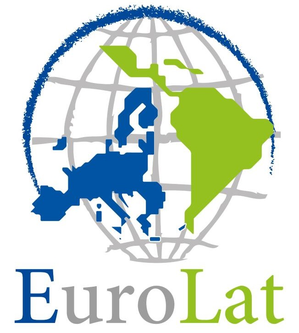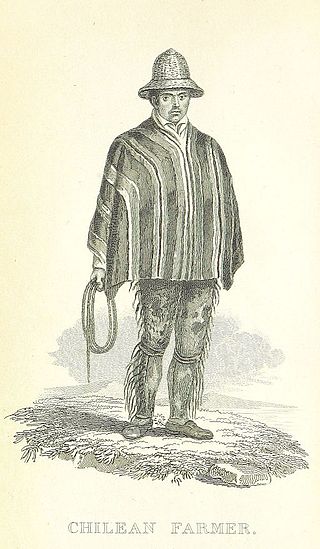| |||||
| Decades: | |||||
|---|---|---|---|---|---|
| See also: | Other events in 1803 · Timeline of Chilean history | ||||
The following lists events that happened during 1803 in Chile .
| |||||
| Decades: | |||||
|---|---|---|---|---|---|
| See also: | Other events in 1803 · Timeline of Chilean history | ||||
The following lists events that happened during 1803 in Chile .
March 3–5: The Parliament of Negrete convenes. It is considered the last great parliament of the colonial period in Chile.

The National Congress of Chile is the legislative branch of the Republic of Chile. According to the current Constitution, it is a bicameral organ made up of a Chamber of Deputies and a Senate. Established by law No. 18678, the city of Valparaíso is its official headquarters.

The Maule Region is one of Chile's 16 first order administrative divisions. Its capital is Talca. The region derives its name from the Maule River which, running westward from the Andes, bisects the region and spans a basin of about 20,600 km2. The Maule river is of considerable historic interest because, among other reasons, it marked the southern limits of the Inca Empire.

The royal governor of Chile ruled over the Spanish colonial administrative district called the Captaincy General of Chile, and as a result the royal governor also held the title of a captain general. There were 66 such governors or captains during the Spanish conquest and the later periods of Spanish-centered colonialism. Since the first Spanish–Mapuche parliaments in the 17th century it became an almost mandatory tradition for each governor to arrange a parliament with the Mapuches.

The Andean Parliament is the governing and deliberative body of the Andean Community, conformed by representatives of its four member states Bolivia, Colombia, Ecuador and Peru, and one associate member, Chile. It is composed of 25 parliamentarians, five representing each state.
This electoral calendar 2006 lists the national/federal direct elections held in 2006 in the de jure and de facto sovereign states and their dependent territories. Referendums are included, although they are not elections. By-elections are not included.

Mauricio José Rojas Mullor is a Chilean-Swedish politician and political economist, member of the Riksdag between 2002 and 2006. He served as Minister of Cultures, Arts and Heritage of Chile for four days, since August 10 2018 until August 13, under the presidency of Sebastián Piñera.

The Occupation of Araucanía or Pacification of Araucanía (1861–1883) was a series of military campaigns, agreements and penetrations by the Chilean army and settlers into Mapuche territory which led to the incorporation of Araucanía into Chilean national territory. Pacification of Araucanía was the expression used by the Chilean authorities for this process. The conflict was concurrent with Argentine campaigns against the Mapuche (1878–1885) and Chile's wars with Spain (1865–1866) and with Peru and Bolivia (1879–1883).

The Euro-Latin American Parliamentary Assembly (EuroLat) is a trans-national body of 150 Parliamentarians from Europe and Latin America. It was established in 2006 to bolster EU-Latin American relations. It was described by Benita Ferrero-Waldner, the European Union's External Relations Commissioner, as "one of the key bodies in ensuring fruitful cooperation between our two regions."
Juan Henríquez de Villalobos ; Spanish soldier and administrator who, after participation in various European wars, was designated as governor of Chile by Mariana of Austria. In this position, between October 1670 and April 1682, he became, according to Chilean historiography, the epítome of the corrupt and nepotistic governor. His government tenure was darkened by a long series of litigations and accusations by oidores of the Real Audiencia of Santiago and other vecinos of the colony. He was one of the governors who left the position richer than he began, with not less than 900 thousand pesos, according to Jose Toribio Medina.
The Parliament of Malloco was held between governor Juan Henríquez de Villalobos and leaders of the Mapuche in January 1671, at Malloco southwest of Santiago, Chile.

Chilean-Romanian relations are foreign relations between Chile and Romania. Diplomatic relations between both countries were established on February 5, 1925. Embassies were established in each other's countries that year but the bilateral relations were interrupted in 1943 because of World War II.
The following lists events that happened during 1808 in Chile.

The following lists events that happened during 1825 in Chile.
The following lists events that happened during 1907 in Chile.

Miapetra Kumpula-Natri is a Finnish politician who currently serves as a Member of the European Parliament (MEP) from Finland. She is a member of the Social Democratic Party, part of the Progressive Alliance of Socialists and Democrats. She has been a Member of the European Parliament since 2014.
The Parliament of Las Canoas was a diplomatic meeting between Mapuche-Huilliches and Spanish authorities in 1793 held at the confluence of Rahue River and Damas River near what is today the city of Osorno. The parliament was summoned by the Royal Governor of Chile Ambrosio O'Higgins after the Spanish had suppressed an uprising by the Mapuche-Huilliches of Ranco and Río Bueno in 1792. The parliament is historically relevant since the treaty signed at the end of the meeting allowed the Spanish to reestablish the city of Osorno and secure the transit rights between Valdivia and the Spanish mainland settlements near Chiloé Archipelago. The indigenous signatories recognized the king of Spain as their sovereign but they kept considerable autonomy in the lands they did not cede. The treaty is unique in that it was the first time Mapuches formally ceded territory to the Spanish.
In the history of colonial Chile, the Parliament of Boroa was a diplomatic meeting held on January 24, 1651, between various Mapuche groups and Spanish authorities held in the fields of Boroa. The parliament was attended by the Governor of Chile, Antonio Acuña Cabrera, who travelled to Boroa incognito from the fortress of Nacimiento in the north accompanied only by six men. This riskful crossing of Mapuche territory was considered a valiant but reckless stunt by Spanish subordinates.

Soraya Marisel Martínez Ferrada is a Chilean-Canadian Liberal politician who was elected as a Member of Parliament in the House of Commons of Canada to represent the federal riding Hochelaga during the 2019 Canadian federal election. She has served as Minister of Tourism and Minister responsible for the Economic Development Agency of Canada for the Regions of Quebec since 2023.
The Parliament of Tapihue of 1825 was a diplomatic agreement between fourteen Mapuche reductions and the newly established Republic of Chile. The Mapuche reductions were represented by the lonko Juan Mariluán and the republic by Colonel Pedro Barnachea. The agreement was aimed to end the Guerra a muerte conflict that had grown out from the Chilean War of Independence. It was also a means for the Chilean government to establish relations with Mapuches.